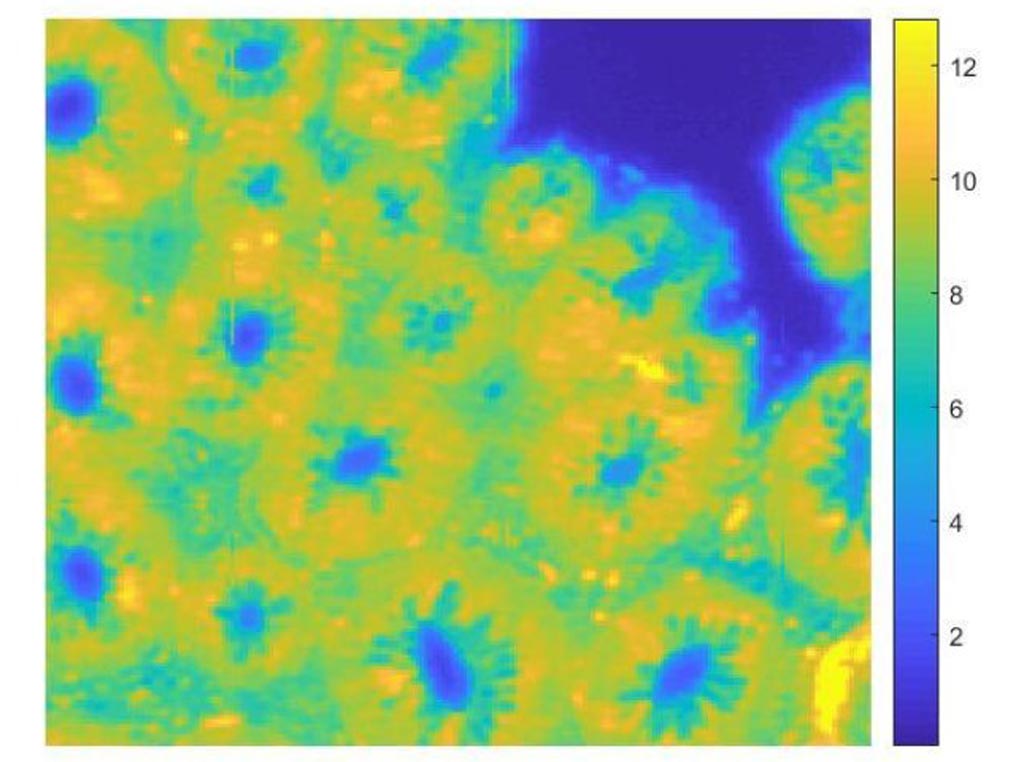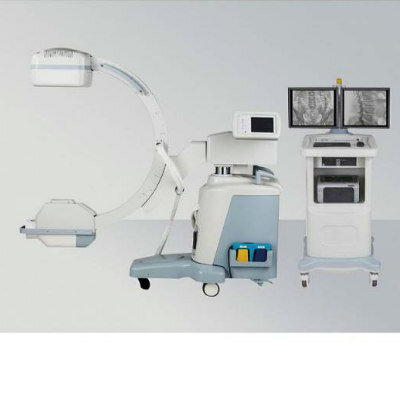IR Spectroscopic Imaging Aids Diagnosis of Colon Cancer
|
By MedImaging International staff writers Posted on 02 Sep 2019 |

Image: A new study asserts that FTIR chemical imaging can help identify colon cancer more accurately (Photo courtesy of ICL).
Fourier-transform infrared (FTIR) spectroscopic imaging can produce 'chemical photographs' of biopsy tissue samples ranging from healthy to cancerous, according to a new study.
Researchers at Imperial College London (Imperial; United Kingdom) and the University of British Columbia (UBC; Vancouver, Canada) undertook FTIR spectroscopic imaging of colon biopsy tissues, combined it with a random forest machine learning (ML) approach in order to classify different stages of colon cancer malignancy. The combination of the optical and ML computational approaches helped eliminate scattering background during the measurements. The results demonstrated that C–H stretching and amide I bands are of little to no significance for the classification of colon malignancy.
The best prediction outcome was found when classification was carried out in the fingerprint region of the mid-infrared spectrum (7-10 micrometers; 1500- 1000 cm−1), which excludes the contribution of amide I and II bands. Overall prediction accuracy was higher than 90%, with dysplastic and hyperplastic tissues well distinguished. The study also showed that computational correction performed better than optical correction, and that disease states can be distinguished effectively even without elimination of scattering effects. The study was published on August 16, 2019, in Analytical and Bioanalytical Chemistry.
“There is urgency in developing new techniques which can identify the early stages of cancer in a way that goes beyond the current histopathology approaches in order to increase survival rates. Coupling spectroscopic imaging with advanced ML approaches aid early detection and understanding of cancer,” said senior author Professor Sergei Kazarian, PhD, of the ICL department of chemical engineering. “There is an excitement of having an enhanced accuracy that promises advances in the early cancer detection and differentiation of disease stages.”
FTIR imaging involves shining an infrared beam at a sample and measuring how much of that light is absorbed at different frequencies, which is used to produce a visual reference of the sample's chemical composition. And although the study was restricted to colon cancer, the researchers have already created models, which have the potential to be applied to other difficult to diagnose cancers such as esophageal cancer, and even non-cancerous anomalies.
Related Links:
Imperial College London
University of British Columbia
Researchers at Imperial College London (Imperial; United Kingdom) and the University of British Columbia (UBC; Vancouver, Canada) undertook FTIR spectroscopic imaging of colon biopsy tissues, combined it with a random forest machine learning (ML) approach in order to classify different stages of colon cancer malignancy. The combination of the optical and ML computational approaches helped eliminate scattering background during the measurements. The results demonstrated that C–H stretching and amide I bands are of little to no significance for the classification of colon malignancy.
The best prediction outcome was found when classification was carried out in the fingerprint region of the mid-infrared spectrum (7-10 micrometers; 1500- 1000 cm−1), which excludes the contribution of amide I and II bands. Overall prediction accuracy was higher than 90%, with dysplastic and hyperplastic tissues well distinguished. The study also showed that computational correction performed better than optical correction, and that disease states can be distinguished effectively even without elimination of scattering effects. The study was published on August 16, 2019, in Analytical and Bioanalytical Chemistry.
“There is urgency in developing new techniques which can identify the early stages of cancer in a way that goes beyond the current histopathology approaches in order to increase survival rates. Coupling spectroscopic imaging with advanced ML approaches aid early detection and understanding of cancer,” said senior author Professor Sergei Kazarian, PhD, of the ICL department of chemical engineering. “There is an excitement of having an enhanced accuracy that promises advances in the early cancer detection and differentiation of disease stages.”
FTIR imaging involves shining an infrared beam at a sample and measuring how much of that light is absorbed at different frequencies, which is used to produce a visual reference of the sample's chemical composition. And although the study was restricted to colon cancer, the researchers have already created models, which have the potential to be applied to other difficult to diagnose cancers such as esophageal cancer, and even non-cancerous anomalies.
Related Links:
Imperial College London
University of British Columbia
Latest General/Advanced Imaging News
- PET Scans Reveal Hidden Inflammation in Multiple Sclerosis Patients
- Artificial Intelligence Evaluates Cardiovascular Risk from CT Scans
- New AI Method Captures Uncertainty in Medical Images
- CT Coronary Angiography Reduces Need for Invasive Tests to Diagnose Coronary Artery Disease
- Novel Blood Test Could Reduce Need for PET Imaging of Patients with Alzheimer’s
- CT-Based Deep Learning Algorithm Accurately Differentiates Benign From Malignant Vertebral Fractures
- Minimally Invasive Procedure Could Help Patients Avoid Thyroid Surgery
- Self-Driving Mobile C-Arm Reduces Imaging Time during Surgery
- AR Application Turns Medical Scans Into Holograms for Assistance in Surgical Planning
- Imaging Technology Provides Ground-Breaking New Approach for Diagnosing and Treating Bowel Cancer
- CT Coronary Calcium Scoring Predicts Heart Attacks and Strokes
- AI Model Detects 90% of Lymphatic Cancer Cases from PET and CT Images
- Breakthrough Technology Revolutionizes Breast Imaging
- State-Of-The-Art System Enhances Accuracy of Image-Guided Diagnostic and Interventional Procedures
- Catheter-Based Device with New Cardiovascular Imaging Approach Offers Unprecedented View of Dangerous Plaques
- AI Model Draws Maps to Accurately Identify Tumors and Diseases in Medical Images
Channels
Radiography
view channel
Novel Breast Imaging System Proves As Effective As Mammography
Breast cancer remains the most frequently diagnosed cancer among women. It is projected that one in eight women will be diagnosed with breast cancer during her lifetime, and one in 42 women who turn 50... Read more
AI Assistance Improves Breast-Cancer Screening by Reducing False Positives
Radiologists typically detect one case of cancer for every 200 mammograms reviewed. However, these evaluations often result in false positives, leading to unnecessary patient recalls for additional testing,... Read moreMRI
view channel
World's First Sensor Detects Errors in MRI Scans Using Laser Light and Gas
MRI scanners are daily tools for doctors and healthcare professionals, providing unparalleled 3D imaging of the brain, vital organs, and soft tissues, far surpassing other imaging technologies in quality.... Read more
Diamond Dust Could Offer New Contrast Agent Option for Future MRI Scans
Gadolinium, a heavy metal used for over three decades as a contrast agent in medical imaging, enhances the clarity of MRI scans by highlighting affected areas. Despite its utility, gadolinium not only... Read more.jpg)
Combining MRI with PSA Testing Improves Clinical Outcomes for Prostate Cancer Patients
Prostate cancer is a leading health concern globally, consistently being one of the most common types of cancer among men and a major cause of cancer-related deaths. In the United States, it is the most... Read moreUltrasound
view channel
Largest Model Trained On Echocardiography Images Assesses Heart Structure and Function
Foundation models represent an exciting frontier in generative artificial intelligence (AI), yet many lack the specialized medical data needed to make them applicable in healthcare settings.... Read more.jpg)
Groundbreaking Technology Enables Precise, Automatic Measurement of Peripheral Blood Vessels
The current standard of care of using angiographic information is often inadequate for accurately assessing vessel size in the estimated 20 million people in the U.S. who suffer from peripheral vascular disease.... Read more
Deep Learning Advances Super-Resolution Ultrasound Imaging
Ultrasound localization microscopy (ULM) is an advanced imaging technique that offers high-resolution visualization of microvascular structures. It employs microbubbles, FDA-approved contrast agents, injected... Read more
Novel Ultrasound-Launched Targeted Nanoparticle Eliminates Biofilm and Bacterial Infection
Biofilms, formed by bacteria aggregating into dense communities for protection against harsh environmental conditions, are a significant contributor to various infectious diseases. Biofilms frequently... Read moreNuclear Medicine
view channel
New Imaging Technique Monitors Inflammation Disorders without Radiation Exposure
Imaging inflammation using traditional radiological techniques presents significant challenges, including radiation exposure, poor image quality, high costs, and invasive procedures. Now, new contrast... Read more
New SPECT/CT Technique Could Change Imaging Practices and Increase Patient Access
The development of lead-212 (212Pb)-PSMA–based targeted alpha therapy (TAT) is garnering significant interest in treating patients with metastatic castration-resistant prostate cancer. The imaging of 212Pb,... Read moreNew Radiotheranostic System Detects and Treats Ovarian Cancer Noninvasively
Ovarian cancer is the most lethal gynecological cancer, with less than a 30% five-year survival rate for those diagnosed in late stages. Despite surgery and platinum-based chemotherapy being the standard... Read more
AI System Automatically and Reliably Detects Cardiac Amyloidosis Using Scintigraphy Imaging
Cardiac amyloidosis, a condition characterized by the buildup of abnormal protein deposits (amyloids) in the heart muscle, severely affects heart function and can lead to heart failure or death without... Read moreImaging IT
view channel
New Google Cloud Medical Imaging Suite Makes Imaging Healthcare Data More Accessible
Medical imaging is a critical tool used to diagnose patients, and there are billions of medical images scanned globally each year. Imaging data accounts for about 90% of all healthcare data1 and, until... Read more
Global AI in Medical Diagnostics Market to Be Driven by Demand for Image Recognition in Radiology
The global artificial intelligence (AI) in medical diagnostics market is expanding with early disease detection being one of its key applications and image recognition becoming a compelling consumer proposition... Read moreIndustry News
view channel
Bayer and Google Partner on New AI Product for Radiologists
Medical imaging data comprises around 90% of all healthcare data, and it is a highly complex and rich clinical data modality and serves as a vital tool for diagnosing patients. Each year, billions of medical... Read more


















